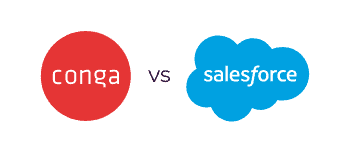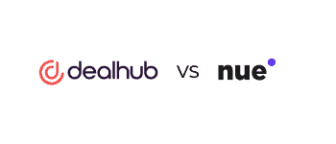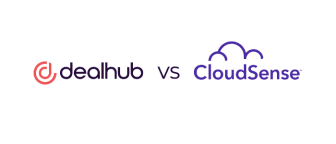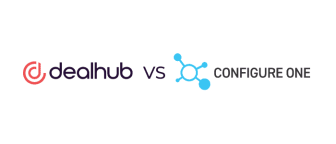Introduction
Compare Salesforce CPQ and Conga CPQ
Conga CPQ and Salesforce CPQ are both cloud-based CPQ solutions that enable businesses to automate the creation and management of quotes, proposals, and contracts. Both offer a range of powerful features, including product configuration capabilities, price optimization tools, guided selling guidance, and other standard out-of-the-box features. However, a few key differences between the two platforms should be accounted for when evaluating them for potential use.
Conga CPQ is a digital commerce solution for configuring complex quotes and contracts. It is ideal for businesses managing multiple product versions and configurations, as well as upsells and cross-sells. The platform also includes advanced pricing and discounting capabilities, allowing users to quickly produce quotes based on negotiated prices.
Salesforce CPQ is an enterprise solution that is part of Salesforce’s core offerings. Salesforce Revenue Cloud is a recent offering with integrated CPQ, billing, and revenue recognition capabilities. This product best suits high-volume businesses requiring automated pricing models and customer segmentation features. Salesforce users benefit from accessibility to other Salesforce applications with the same UI.
Product Overview
Overview of each CPQ Solution
How organizations use Conga CPQ and Salesforce CPQ will differ depending on the organization’s needs. Here’s a quick overview of each product:
Defining Conga CPQ
Conga CPQ helps businesses streamline their sales processes with advanced automation and guided selling capabilities. It enables sales teams to quickly generate accurate, customized quotes while managing complex pricing structures, product configurations, and contract terms. Conga CPQ integrates seamlessly with Conga’s suite of revenue lifecycle management tools, allowing organizations to optimize their entire quote-to-cash process, from pricing approvals to contract execution.
A key strength of Conga CPQ is its flexibility in handling intricate pricing models and contract management. This makes it well-suited for industries with complex sales cycles, such as manufacturing, healthcare, and financial services. It supports AI-driven analytics, approval workflows, and automated document generation to reduce errors and accelerate deal velocity. Additionally, Conga CPQ integrates with Salesforce CRM and other business applications, providing a connected ecosystem for sales and revenue teams.
Defining Salesforce CPQ
Salesforce CPQ is a cloud-based CPQ solution built natively on the Salesforce platform, offering a seamless experience for businesses already using Salesforce CRM. It provides robust tools for product configuration, pricing automation, and quote generation, ensuring sales teams can create fast, error-free proposals. With built-in AI capabilities, Salesforce CPQ helps businesses optimize pricing strategies and approvals while maintaining compliance with company policies.
A significant advantage of Salesforce CPQ is its deep integration with the broader Salesforce ecosystem, including Sales Cloud, Service Cloud, and Revenue Cloud. This connectivity ensures a unified data flow across sales, finance, and customer service functions, accelerating quote-to-cash and enabling more accurate forecasting and revenue recognition. Additionally, Salesforce CPQ offers a user-friendly interface, guided selling features, and automated contract lifecycle management, making it a strong choice for companies seeking a streamlined, end-to-end sales process.
Product Features
Comparison of Key Features
Salesforce CPQ and Conga CPQ offer various features like product configuration, discounting, validated pricing, guided selling, rules-based quoting, and more. The main distinction between the two lies in their ability to provide a more granular product setup tailored to each customer’s unique business needs.
Conga CPQ is exceptionally flexible in capturing customers’ requirements, while Salesforce CPQ offers powerful capabilities that enable businesses to adapt to changing market dynamics effectively.
Here’s a breakdown of each product’s features:
| Conga CPQ | Salesforce CPQ |
|---|---|
| Native integration with Salesforce CRM. Custom integrations with other CRM systems are available. | Configure complex product combinations with the same user interface as Salesforce CRM. |
| Integration for connecting with third-party software, including DocuSign, Adobe Sign, HubSpot, Salesforce Sales Cloud, Dropbox, SAP, NetSuite, and Google Drive. | Provide real-time insights into customers, deals, and prospects through its integration with Salesforce’s CRM platform. |
| Relatively fast integration with minimal downtime and setup fees. | IT implementation takes an average of 6-9 months. |
| Guided selling with real-time deal scoring speeds up the sales cycle and makes selling easier. | Salesforce offers pre-built guided selling capabilities, but complicated workflows require custom coding and development. |
| Scalable microservices architecture makes it easy for companies to add and remove services and users as they shift their organizational goals. | Additional products, services, features, and integrations require greater investment from the company in both capital and time. |
| Digital proposals can be easily sent via attachable files or links, allowing companies to provide their customers with one point of interaction throughout all stages of the deal. | Each price quote is delivered as an attachable file, and any alterations necessitate a new version of the document. |
| Unlimited configurations for complex products and services, rules-based pricing, and unlimited attributes for configuration available out-of-the-box. | Additional features and licenses are available for added costs. |
| The user interface makes configuring pricing, discounting, carts, and check-out processes easy. | Customer communication within the Salesforce platform and its partners (like Slack). |
| Subscription, renewal, and order management capabilities with asset-based ordering. | Subscription management and complex billing capacity, plus advanced order management for enterprise customers. |
| Cross-sell and upsell insights with full contract visibility that show sales reps where to offer additional products. | Detailed reporting analytics for optimized pricing strategies and discount arrangements. |
| Automated approval workflows for faster turnaround times and quote collaboration across teams and stakeholders with audit trails. | Full-cycle quote-to-cash automation with Revenue Cloud. |
| Price optimization with price waterfall and cost analyses. | Profitability, discount structure, and revenue intelligence insights synced with the Salesforce platform |
| Web-based platform with software integration. | Web and mobile (iPhone and Android) platforms. |
| Phone support Email responses Community and forum FAQ and knowledge base Video tutorials Webinars New user training and onboarding | Phone customer support Knowledge base Salesforce Trailhead (self-service learning) Customer onboarding |
Customer Size
Ideal Customer Profiles
Conga CPQ is a solid solution for medium and large organizations, as it offers unbeatable product configuration capabilities that allow you to create customized pricing proposals based on different scenarios. For mid to large-sized companies, Conga CPQ is a happy medium between flexibility and automation.
Salesforce CPQ is tailored to meet the needs of businesses large and small, and multiple business types use it to streamline their operations. It can easily integrate with other Salesforce applications, and its microservices architecture makes it suitable for any organization, regardless of size.
That said, Salesforce itself is generally an enterprise solution. Many businesses find a less complex system preferable because Salesforce requires additional IT infrastructure to implement at higher scales.
Conga is designed for complex pricing models, but agencies, vendors, and suppliers can implement the CPQ platform without as significant of an IT implementation cost, albeit with less customizability (i.e., custom coding).
Pricing
Breakdown of Pricing Options
Conga CPQ and Salesforce CPQ have slightly different pricing models. Conga is almost completely microservice-based, meaning users sign up and pay for features that they use. Salesforce CPQ has a few basic offerings, but the pricing is based on a subscription model and features are bundled together.
The base offering for Salesforce CPQ is one of the the priciest CPQ options, and adding products from its partner ecosystem makes it even more expensive than other solutions. Getting separate software from Salesforce partners and integrating it may also be more expensive and cumbersome than finding a solution that can do it all.
It is difficult to know exactly how much customers can expect to pay for a Conga CPQ plan, as there is no single set of pricing points (and no public information about the subject). However, pricing starts at $35 per user per month, making it one of the most affordable starting out.
| Conga CPQ | Salesforce CPQ | |
|---|---|---|
| Product Pricing | Custom configuration – contact sales | CPQ: $75 per user per month (billed annually) CPQ Plus: $150 per user per month, billed annually CPQ + Billing Growth: Contact sales CPQ + Billing Plus: Contact sales |
| Implementation Fees | One-time implementation fee | Ongoing implementation fees for custom coding |
| Additional Licenses | Additional product costs on a per-user basis | Additional license fees for e-sign, contract management, buyer engagement tracking, and other licenses. |
To get the most out of Salesforce CPQ, businesses can expect to pay additional customization costs, licensing fees, and training costs in addition to the one-time implementation fee. Higher-level feature sets require more complex setups and expensive integrations, making it best suited for those with larger budgets.
With Conga, you only pay for the features you use. Since they are all part of the same platform, there’s no need to integrate separate applications like CLM and billing. This makes it a great option for businesses looking for an all-in-one solution without the extra costs associated with Salesforce CPQ.
Summary
Considerations for Choosing Between the Two Solutions
Conga and Salesforce are powerful solutions for enterprise companies. Businesses using Salesforce like it for its endless customizability and integration capabilities, while Conga may be more affordable and offer many of the same features.
For medium—and large-sized businesses, Conga CPQ makes the most sense. Originally built for the Salesforce platform before branching out, it offers pricing flexibility and automation, even for Salesforce users. Since it doesn’t require third-party partners to add features like contract management (CLM), it can be a great option for businesses that want to keep everything simple.
Salesforce offers a robust software suite—including Salesforce CPQ—perfect for organizations of any size, especially those with complicated technologies and IT systems. Prior to making a purchase decision, consider whether the implementation fees, update costs, and customizations will be worth the total cost of ownership (which may include help from external consultants).
FAQs
Frequently Asked Questions
The main difference between Conga CPQ and Salesforce CPQ is that Conga is a one-stop shop for pricing automation, while Salesforce requires additional IT infrastructure to implement. Both platforms offer powerful features for enterprise companies, with Conga being the more affordable option.
Conga CPQ was originally built for the Salesforce platform, before finding success as a standalone CPQ that integrates with numerous systems. Conga CPQ in Salesforce refers to Conga’s ability to integrate with Salesforce CRM, allowing businesses to manage pricing, contracts, and customer data from the same platform while syncing information between the two.
Conga provides an array of robust, integrated solutions with Salesforce. Managing and sharing data as well as client documentation is a breeze, allowing for effortless processes that take the customer experience to new heights from beginning to end.
Conga was first released on the Salesforce AppExchange in 2006 and Salesforce Ventures remains an investor in the company. But Conga is its own platform, independent of Salesforce. Conga CPQ customers are not necessarily Salesforce customers and can use it with other CRM’s. However, Salesforce users will find a deep integration between the two platforms.
Salesforce CPQ is designed with user-friendliness in mind, offering a highly intuitive interface that integrates seamlessly with the Salesforce ecosystem. However, like any robust solution, there is a learning curve, especially for users unfamiliar with CPQ processes or Salesforce itself. For those who are already accustomed to Salesforce, the transition to Salesforce CPQ can be smoother as it maintains the familiar interface and workflows.
That said, setting up Salesforce CPQ to match your organization’s specific needs—such as configuring pricing rules, product catalogs, and approval workflows—may require technical expertise. Salesforce offers comprehensive support, training resources, and a large user community to help users get up to speed. For organizations seeking faster implementation, working with certified Salesforce CPQ consultants can also ease the learning process and ensure a smoother adoption.
Salesforce CPQ development is a separate topic in Salesforce’s training and certification modules. It is ranked among the most difficult, so completing those courses can provide a solid foundation for understanding the platform.
Conga Contracts for Salesforce is a contract lifecycle management (CLM) solution that integrates directly with Salesforce to streamline and automate the entire contract process. It allows businesses to create, manage, and track contracts within the Salesforce environment, eliminating manual tasks and reducing errors.
With Conga Contracts, users can automate contract creation, approval workflows, and e-signatures, while ensuring compliance with predefined terms and conditions. The solution also provides visibility into contract status, renewal opportunities, and other key contract metrics, improving efficiency and reducing risks associated with contract management. The integration with Salesforce ensures seamless data flow between sales, legal, and finance teams, helping organizations accelerate the quote-to-cash process and enhance contract visibility.

Rhonda Bavaro excels in boosting SaaS companies’ growth through innovative content marketing, thriving in the dynamic sales tech industry amidst evolving technologies that drive revenue acceleration.








